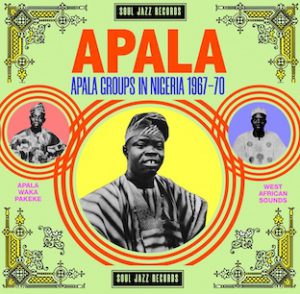 いやいや、アパラですよ、それもアインラ・オモウラ登場前のアパラ、ということで、そーなると当然、その頃はハルナ・イショラ人気独占状態だったわけですが…、並んでますねえ、知らない歌い手が、全18曲中11曲も!うち、当方入荷済みシンガーは>こちらぐらいじゃないでしょうか?
いやいや、アパラですよ、それもアインラ・オモウラ登場前のアパラ、ということで、そーなると当然、その頃はハルナ・イショラ人気独占状態だったわけですが…、並んでますねえ、知らない歌い手が、全18曲中11曲も!うち、当方入荷済みシンガーは>こちらぐらいじゃないでしょうか?
やっぱりこの時期、LPアルバムをリリースするアパラ歌手といえば、ハルナとカスムぐらいだったようで、ほか、シングル・アーティストということになるでしょうね、LP単位でCD化を行うナイジェリアのこと、この辺の60年代アパラ歌手が現地CD化されていないもは仕方ないというか当然、それはそれで残念ですが、こうしてとうとう日の目を見た60年代アパラの未知のアーティストを聴けること、皆さんとともに喜びたいと思います。
…が、それはそうと、アデクンレ・アジョとか、アイサトゥ・アラビなんて女性歌手も並んでいるのにはビツクリ(女声アパラ・シンガーがいたなんて!“アパラ風ワカ” だそうですけど…by bunboni さん)。面白いですねえ!アパラ好きには見逃せない60年代末のアパラ・コレクションの登場です。
これまでにも、サンテリアやアフロ・ルンバ、ヴードゥーなど、アフロ系ルーツのパーカッション音楽に特化した復刻コレクション出して来たソウル・ジャズ・レコーズのこと、サカラやウェレ、フジやワカ等々とヨルバ〜ナイジェリア系打楽器音楽の復刻コレクションをこれからもどんどん、リリースして欲しいですねえ。
1 Haruna Ishola And His Apala Group /Ewure Ile Komoyi Ode
2 Adebukonla Ajao And Her Group /Aboyin Ile
3 Rapheal Ajide And His Apala Group /Adura Fun Osiwowo
4 Haruna Ishola And His Apala Group /Orin To Mo Gbon Wa
5 RA Tikalosoro And His Group /Agilinti Lomu
6 Adebukonla Ajao And Her Group /ABD Alawiye
7 Haruna Ishola And His Apala Group /Asa Ko Gbodo Wole Gbeiyele
8 Adeleke Aremu And His Group /Egbe Arowolo
9 Haruna Ishola And His Apala Group /Rufai Baolgun
10 RA Tikalosoro And His Group /Kiniun Kuro Leran Amu Sere
11 Haruna Ishola And His Apala Group /S Aka
12 Adebukonla Ajao And Her Group /Lekele Bale
13 Kasumu Adio & His Apala Group /Odale Ore
14 Ayisatu Alabi And Her Group /Oko Lolomo
15 Jimoh Agbejo Bo Ogun And His Group /Oriki Ibeji
16 Ayisatu Alabi And Her Group /Omo Olobi
17 Rapheal Ajide And His Apala Group /Orin Aje
18 Adebukonla Ajao And Her Group /Sunday Babayemi
Soul Jazz Records new ‘Apala: Apala Groups in Nigeria 1967-70’ is the first ever collection of Apala music to be released outside of Nigeria.
The album focusses on a wide selection of recordings made in Nigeria in the 1960s, a time when Apala music was at the height of its popularity. Apala is a deeply rhythmical, hypnotic and powerful musical style that combines the striking nasal-style vocals and traditions of Islamic music, the Agidigbo (thumb piano), and the equally powerful drumming and percussion rhythms and techniques of the Yoruba of Nigeria.
The most significant figure in Apala music is undoubtedly Haruna Ishola who features throughout this album. Ishola holds an almost mythological status in his role as populariser of Apala music in Nigeria. Ishola’s singing was believed to be so powerful that, without proper restraint, it could kill the recipient of his music.
Apala is a popular music that also functioned as a form of cultural resistance – Apala music involved no western instrumentation and is sung in the Yoruba language, its aesthetic an implicit cultural rejection of the British Empire’s colonial rule over Nigeria which lasted from 1901 until independence in 1960.
Apala music was popular and widely accepted in Nigeria due to its philosophical and profound lyrical content alongside the complex rhythmic patterns of this heavily percussive style, which highlighted many of the percussion instruments of south-west Nigeria.
Apala is one of a number of popular urban styles of music that came out of Nigeria in the 20th century and sits alongside the more well-known (in the West) styles of Fuji, Highlife, Juju and Afrobeat. Of these modern forms Apala remains perhaps the most ‘roots’ style (sometimes described as ‘neo-traditional’) due to the authenticity of its sound. It has similar Islamic roots to other neo-traditional styles of Nigeria – including Waka and Sakara – examples of which are also included on this collection contextualising the music of Apala.
These recordings were originally made and released locally by Decca and EMI Records as well as a variety of independent labels in Nigeria and have never been released outside of the country before. Soul Jazz Records are releasing this album as a deluxe double gatefold vinyl (+ download code), CD, slipcase and booklet, both containing full text and photography. (メーカーインフォより)

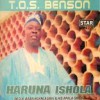 HARUNA ISHOLA / T.O.S. BENSON
HARUNA ISHOLA / T.O.S. BENSON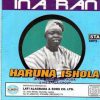 HARUNA ISHOLA / INA RAN
HARUNA ISHOLA / INA RAN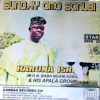 HARUNA ISHOLA / SUNDAY OMO SONUBI
HARUNA ISHOLA / SUNDAY OMO SONUBI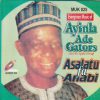 AYINLA ADEGATORS / IKILO – ASALATU FA ANABI – EYIN AIRUN MA KI OKAN
AYINLA ADEGATORS / IKILO – ASALATU FA ANABI – EYIN AIRUN MA KI OKAN